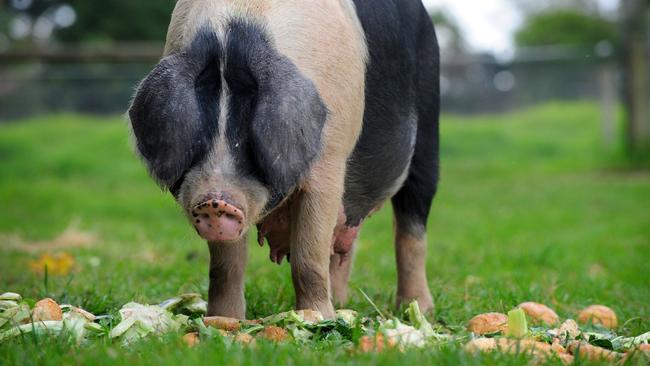Swill feeding pigs poses huge FMD risk
Swill feeding of pigs led to the devastating 2001 outbreak of foot and mouth disease in the UK. Australia risks making the same mistake.

Swill feeding of pigs poses the greatest risk of introducing foot and mouth disease to Australia, experts say, despite state governments failing to audit hundreds of backyard operators.
Farmers fear it would only take one food outlet or restaurant to supply live FMD-contaminated food waste to a backyard pig producer to spark an outbreak costing the Australian livestock industry up to $80 billion in lost market access, compensation and clean-up costs.
“The most significant risks for feeding of prohibited pig feed are those who are pig keepers – producers who own seven sows or less,” Animal Health Australia reports in its 2021-22 swill feeding guidelines report.
While AHA co-ordinates audits of 2500 smaller PigPass producers, they “only need to be registered ... when they move pigs – and that this will lapse if there has been no movement reported in the previous two years”.
AHA reported just 986 pig owners were registered with PigPass in Victoria last year, but Victorian Farmers Federation livestock president Steve Harrison said they had identified 1500-2000 pig producers, via their Stock Sense program, who mostly lived in peri-urban zones around Melbourne and the state’s regional cities and towns.
“Make no mistake, most are being fed food waste,” Mr Harrison said. “We’re just sitting ducks”.
AHA biosecurity chief Rob Barwell said compliance was high among the piggeries, catering venues and potential sources of swill that each state audits, but it when it came to hobby farmers it was “harder to communicate with and get these messages out to them”.
Federal Agriculture Minister Murray Watt last week revealed non-infectious FMD viral fragments had been repeatedly detected in imports - both legal and illegal.
FMD can be transmitted in meat and dairy products, which is why state agriculture departments have even warned against feeding pigs fruit and vegetables that may have mixed with any meat, dairy or poultry.
A quick search of the Gumtree online marketplace last week showed an image from a backyard pig owner at Marburg in Queensland of food waste containing egg shells and cheese - used in a bid to source food waste.
“More than happy to take any unwanted food scraps that aren’t meat to feed my goats, pigs and poultry - no amount too big or small,” the producer stated.
However Queensland’s Biosecurity Act 2014 prohibits feeding pigs “food scraps from a restaurant, hotel or home that may have been in contact with meat or meat products or other material derived from a mammal or bird”.
By Monday this week the Gumtree advertisement had been taken down.
Australian Pork Limited chief executive Margo Andrae said “owners in all states and territories must only provide quality assured feed to their pigs”.
Scotland’s former top veterinarian Charles Milne, who was also Victoria’s chief veterinary officer from 2014 to 2019, said the devastating 2001 UK outbreak “was associated with the feeding of swill to pigs” and described them as “virus factories”.
“They (pigs) can produce plumes of virus that can transmit disease over significant distances,” Dr Milne said. “Indeed this was how the disease spread in the UK in 2001 from the initially infected pig farm.”
The greatest fear among livestock producers is that an FMD outbreak spreads into Australia’s 25 million feral pigs, where it would become endemic and cripple the livestock industry.
Last week Mr Watt announced FMD viral fragments had been picked up in imported meat four times in the past decade, with the latest detections found in pork products in Melbourne CBD retail outlets, plus on in beef found in a traveller’s luggage.
Illegal imports of meat products have also been left off manifests by unscrupulous traders in the past.
In 2011 the Australian Quarantine and Inspection Service failed to pick up about 100 tonnes of frozen cooked and uncooked food from Korea, which was in the midst of major FMD outbreaks.
AQIS was forced to track down 225 Korean import consignments - containing pork, chicken and beef, plus ice cream - that had been sent out to 300 Australian food outlets.
While all the recent focus has been on Indonesia’s FMD outbreak, there have also been incidences of the disease in China and South Africa this year. China recorded FMD outbreaks in December and April while South Africa reported 56 outbreaks in May.
The United Nation’s Food and Agriculture Organisation most recent 2022 quarterly report on FMD states endemic pools of the disease are “continuously circulating and evolving” across China, Taiwan, South Korea, Laos, Malaysia, Thailand and Vietnam.
FMD viral pools are also found India, Nepal, Sri Lanka and Russia, plus Pakistan, the Middle East and most of Africa and Venezuela
“In the absence of specific reports, it should be assumed that the serotypes … are continuously circulating in parts of the pool area and would be detected if sufficient surveillance was in place,” the FAO reported.
The AHA has been compiling audits of PigPass properties, food outlets and waste facilities that each state inspects annually, but its spokesman told The Weekly Times they could not be released publicly until each state’s chief veterinary officer had agreed to do so.



